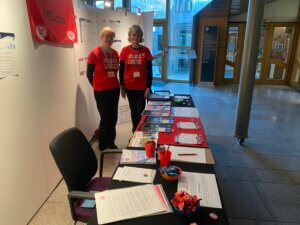MEDIA ADVISORY FOR: Tuesday, September 27, 2016
CONTACT: Anna Zuccaro | +1-914-523-9145 | anna@unbendablemedia.com
TUESDAY 11AM: Bay Area Residents Rally Demanding Support for Patients Suffering with Myalgic Encephalomyelitis / Chronic Fatigue Syndrome
Thousands Worldwide Join an International Day of Action Urging Public Health Officials to Ramp Up Funding for ME/CFS Research, Clinical Trials and Education
Myalgic Encephalomyelitis is a Neuroimmune Disease That Impacts as many as 2.5M Americans
SAN FRANCISCO, CALIFORNIA — On Tuesday, September 27th, over a hundred Bay Area Myalgic Encephalomyelitis (also commonly called Chronic Fatigue Syndrome) patients, advocates and medical experts will rally outside City Hall in an effort to raise awareness of ME/CFS and to call for increased funding for research, clinical trials and medical education into the disease.
The San Francisco rally is part of a global Day of Action spearheaded by #MEAction.net, an international network of patients and allies fighting for health equality for Myalgic Encephalomyelitis. The event aims to bring attention to the #MillionsMissing around the world who suffer from the disease with little hope for improvement- lacking a clear cause of their disease or appropriate clinical care.
At the demonstration, Ronald W. Davis, PhD, Director of the Stanford University Genome Technology Center, whose work was instrumental to the Humane Genome Project, will speak about his groundbreaking research into ME/CFS. Davis’ son has become so severely ill with ME/CFS, he has been unable to eat, talk or leave his room for the last three years. Jose Montoya, MD, Professor of Medicine (Infectious Diseases and Geographic Medicine) at Stanford University will also discuss his groundbreaking work on ME/CFS. #MillionsMissing activists will unveil a 60-foot banner of pillowcases depicting people living with ME/CFS. The banner was made 15-years-ago as a “banner of hope,” and yet the ME community continues to suffer today from a paucity of hope, as a result of the the lack of FDA-approved treatments and continued inadequate research funding.
WHEN: Tuesday, September 27th at 11:00am PT
WHERE: City Hall, Van Ness Avenue steps, 600 block of Van Ness Avenue.
SPEAKERS INCLUDE: Dr. Ronald W. Davis, PhD, Director of the Stanford Genome Technology Center at Stanford University; and Jose Montoya, Professor of Medicine (Infectious Diseases and Geographic Medicine) at the Stanford University Medical Center.
RSVP HERE: https://my.meaction.net/events/millions-missing-protest-san-francisco
LOCAL CONTACT: David Bergstrom, [email protected]
#MillionsMissing events will take place in 25 cities around the world, including 12 cities in the United States.
FIND AN EVENT HERE: http://millionsmissing.org/join/
Myalgic Encephalomyelitis (ME), or Chronic Fatigue Syndrome (CFS), is a systemic neuroimmune disease characterized by post-exertional malaise (a severe worsening of symptoms after even minimal exertion). It causes dysregulation of both the immune system and the nervous system. The effects of ME are devastating enough to leave 25% of patients housebound or bedbound and an estimated 75% unable to work.
The #MillionsMissing movement has emerged as patients are outraged over the continued lack of research funding and the absence of medical education – currently there is no training for ME in medical schools. Researchers have estimated that 1 to 2.5 million Americans have ME – more Americans even than those who suffer with Multiple Sclerosis – yet as the National Academy of Medicine noted in its report, “Beyond Myalgic Encephalomyelitis/Chronic Fatigue Syndrome: Redefining an Illness,” there has been “remarkably little research funding” to date to discover its cause or possible treatments.
Earlier this month, 55 members of Congress signed a bipartisan letter to National Institutes of Health Director Francis Collins urging increased funding for biomedical research into Myalgic Encephalomyelitis/Chronic Fatigue Syndrome (ME/CFS).
The #MillionsMissing rally also comes on the heels of a landmark paper published by Robert Naviaux, a researcher at University of California San Diego, that suggests ME may cause the body to go into a semi-hibernation state.
“This is about more than just a disease. This has become a social justice issue. There simply must be more research funding and medical education in order to stop this epidemic,” explained Jennifer Brea, co-founder of #MEAction. “For too long, people living with ME have been missing from their lives – from their careers, their family and friends, their daily routines – but that time is over. We need real investments in research to guarantee that people who suffer from this disease will no longer be relegated to the shadows. That’s why we are calling on our government to dramatically increase funding into ME research and treatment to help alleviate the millions currently missing from their lives.”
FOR MORE INFORMATION ABOUT MYALGIC ENCEPHALOMYELITIS: http://millionsmissing.org/learn/
For more information, or to speak with someone from #MEAction about ME/CFS, the #MillionsMissing day of action, or current research efforts into the disease, please contact Brett Abrams at 516-841-1105 or by email at [email protected].

#MEAction Scotland volunteers in Scottish Parliament
Volunteers from #MEAction Scotland and Long Covid Scotland talked to over 60 MSPs (Members of the Scottish Parliament) at an Information Stall in the Scottish Parliament from 5th-7th November. Ben Macpherson MSP for Edinburgh Northern and Leith sponsored the stall on behalf of #MEAction Scotland as we aimed to make MSPs aware of the desperate




